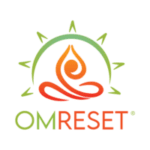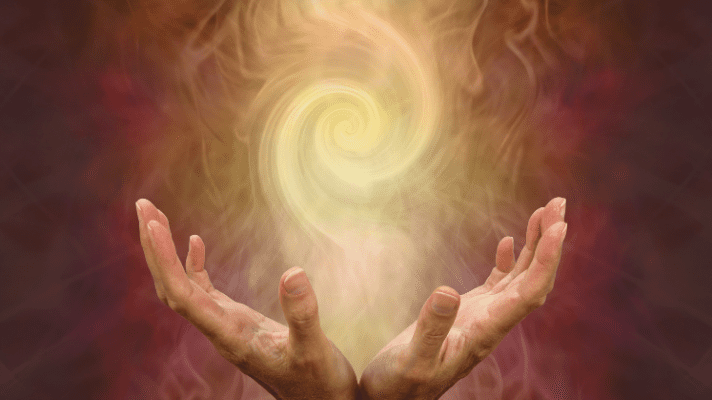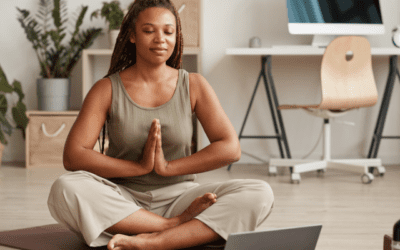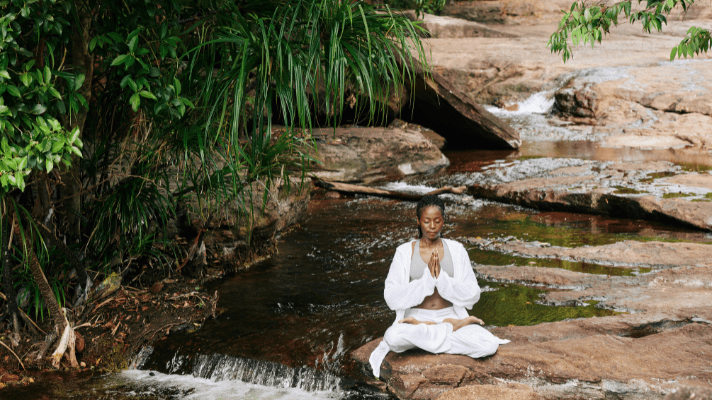Reiki is a gentle yet powerful energy healing form that helps reduce stress and promote well-being. It’s a natural way to restore balance, harmony, and clarity to your life – so you can enjoy the freedom of living on your terms.
Introduction to Reiki and its benefits:
Reiki originated in Japan as a gentle and non-invasive healing technique. It involves channeling universal life force energy through the hands of a trained practitioner to promote physical, emotional, mental, and spiritual well-being.
The word “Reiki” can be translated as “universal life energy” or “spiritually guided life force energy.” The belief is that there is a vital life force energy that flows within and around us, and when this energy is blocked or depleted, it can lead to imbalances and health issues.
During a Reiki session, the practitioner places their hands on or near the recipient’s body, allowing the energy to flow through them and into the recipient. The energy balances and harmonizes the body’s energy centers, known as chakras, and restores the natural energy flow throughout the body.
One of the primary benefits of Reiki is deep relaxation and stress reduction. It helps to activate the body’s relaxation response, promoting a state of calm and peace. It can benefit individuals dealing with anxiety, tension, or chronic stress.
Reiki also supports pain management by stimulating the body’s natural healing abilities. It can help alleviate physical discomfort, whether it’s related to acute injuries, chronic conditions, or general pain.
On an emotional level, Reiki can assist in releasing negative emotions and promoting emotional healing. It provides a nurturing space for individuals to process and let go of emotional blockages, leading to greater emotional well-being and resilience.
Furthermore, Reiki can enhance self-awareness and personal growth. It can help individuals gain insight into their thoughts, emotions, and belief patterns, allowing for personal transformation and empowerment.
For those seeking spiritual connection and growth, Reiki can serve as a tool for accessing higher states of consciousness, intuition, and spiritual experiences. It can support individuals in connecting with their inner selves and the universal energy around them.
It’s important to note that Reiki is a complementary therapy, not a replacement for medical or mental health treatment. It can easily be part of a holistic approach to well-being, and a certified Reiki Instructor should facilitate the session.
Reiki offers many benefits for individuals seeking relaxation, stress reduction, pain management, emotional healing, personal growth, and spiritual connection. Its gentle nature and ability to promote balance and harmony make it a valuable tool for supporting overall well-being.
What is the history of Reiki?
Reiki is a healing technique that originated in Japan in the early 20th century. Reiki, founded by Mikao Usui, was a Japanese Buddhist monk who sought to find a way to promote healing and spiritual growth.
Usui embarked on a personal journey of self-discovery and enlightenment. After years of studying various ancient texts and practicing meditation, he experienced a profound spiritual awakening on Mount Kurama in 1922. It began his exploration into the healing energies known as Reiki.
Following his epiphany, Usui developed an energy healing system that channels universal life force energy through the hands. He called this system “Reiki,” translated as “universal life energy” or “spiritually guided life force energy.”
Usui began teaching Reiki and established the Usui Reiki Ryoho Gakkai (Usui Reiki Healing Society) in Tokyo to spread his teachings. The practice gained popularity and attracted students from various backgrounds.
One of Usui’s students, Chujiro Hayashi, further developed and expanded Reiki, creating a more structured system with hand positions and procedures for different ailments. After Usui died in 1926, Hayashi became one of the key figures responsible for preserving and disseminating Reiki.
Hawayo Takata, a Japanese-American woman, was crucial in introducing Reiki to the Western world. She underwent Reiki training under Hayashi and later became a Reiki master. Takata brought Reiki to Hawaii and began teaching and practicing there, eventually spreading it throughout North America.
Since then, Reiki has continued to grow in popularity worldwide. Numerous Reiki lineages and variations have emerged, each with its unique approach and teachings. Today, millions of people practice Reiki as a complementary therapy to promote relaxation, reduce stress, and support overall well-being. Its principles and techniques have become integrated into various holistic and alternative healing modalities.
How can Reiki help you?
Reiki has a range of benefits for individuals on physical, emotional, mental, and spiritual levels. Here are some ways in which Reiki can help:
1. Relaxation and stress reduction: Reiki promotes deep relaxation, helping to reduce stress, anxiety, and tension. It activates the body’s natural relaxation response, allowing individuals to experience a sense of calm and peace.
2. Pain management: Reiki can help alleviate pain by promoting the body’s energy flow. It is often used as a complementary therapy to support conventional medical treatments for chronic pain conditions.
3. Emotional well-being: Reiki can assist in releasing emotional blockages and promoting emotional healing. It can help individuals process and release negative emotions, promote a positive outlook, and enhance emotional resilience.
4. Energy balancing: Reiki works to balance the energy centers in the body, known as chakras, improving overall energy flow and vitality. Restoring balance can support the body’s natural ability to heal itself.
5. Enhanced self-awareness and personal growth: Reiki can facilitate self-reflection and self-discovery, helping individuals gain insight into their thoughts, emotions, and belief patterns. This increased self-awareness can lead to personal growth, empowerment, and a deeper understanding of oneself.
6. Support during life transitions: Reiki can be particularly beneficial during change or growth, such as starting a new job, moving homes, or dealing with loss. It can provide comfort, guidance, and a sense of grounding during challenging times.
7. Improved sleep: Many individuals report improved sleep quality and relaxation after receiving Reiki. It can help balance the body’s energy and promote deep relaxation, facilitating better sleep patterns.
8. Spiritual connection and growth: Reiki can be a tool for individuals to deepen their spiritual practice and connection with their higher selves or universal consciousness. It can aid in accessing higher states of awareness, intuition, and spiritual growth.
It’s important to note that Reiki is not a substitute for medical or mental health treatment but can be used as a complementary approach to support overall well-being. Reiki practitioners serve as conduits for the healing energy, providing a safe and nurturing space for individuals to benefit from this gentle, non-invasive healing modality.
What are the different types of Reiki treatments available?
Various Reiki treatments are available, each with a unique approach and techniques. Here are some of the different types of Reiki:
1. Usui Reiki: This is the traditional form of Reiki developed by Mikao Usui in Japan. It involves the hands-on channeling healing energy to balance the body’s energy centers and promote healing.
2. Karuna Reiki: Karuna Reiki, developed by Reiki master William Lee Rand, is an advanced form of Reiki that focuses on compassionate healing. It emphasizes working with higher vibrational energies, deep emotional healing, and spiritual growth.
3. Kundalini Reiki: Kundalini Reiki is a powerful form of Reiki that aims to awaken and activate the Kundalini energy, which may be dormant at the base of the spine. It works to clear energetic blockages and promote spiritual awakening.
4. Tibetan Reiki: Tibetan Reiki incorporates elements of traditional Tibetan healing practices and Buddhist philosophies. It combines Reiki energy with specific Tibetan symbols, mantras, and healing and spiritual transformation techniques.
5. Gendai Reiki: Gendai Reiki is a modern form of Reiki that integrates Usui Reiki teachings with other healing modalities and concepts. It includes additional techniques and approaches to suit the needs of practitioners.
6. Seichim Reiki: Seichim Reiki originated in ancient Egypt, also known as Sekhem or SKHM Reiki. It combines Reiki energy with Seichim energy, described as a more feminine, nurturing, and intuitive form of healing energy.
7. Animal Reiki: Animal Reiki is a specialized form of Reiki that focuses on providing healing energy to animals. It can help reduce stress and anxiety and promote wellness in pets and other animals.
8. Distance Reiki Healing: Distance Reiki allows practitioners to send healing energy to individuals who are not physically present. It works on the understanding that energy is not limited by time or space, making it possible to receive the benefits of Reiki remotely.
It’s important to note that while there may be different forms and styles of Reiki, the underlying principles of channeling healing energy and promoting balance remain consistent. Each practitioner may have their unique approach and technique within their chosen Reiki tradition.
Tips and techniques for getting started with Reiki
If you’re interested in getting started with Reiki, here are some tips and techniques to help you begin your journey:
- Find a Reiki practitioner or teacher: Find a qualified Reiki practitioner or teacher who can guide you through the practice. Look for someone who has received proper training and certification in Reiki.
- Receive Reiki treatments: Experience a series of Reiki treatments from a practitioner to understand how it feels and observe its effects on your body, mind, and energy. This firsthand experience will help you connect with the energy and gain insight into its possibilities.
- Learn the Reiki principles: Familiarize yourself with the five principles or precepts of Reiki, which serve as guiding principles for living a balanced and harmonious life. These principles include statements like “Just for today, I will not be angry” and “Just for today, I will be grateful.”
- Start self-healing practice: Begin incorporating Reiki self-healing into your daily routine. You can do this by touching various body parts, such as the head, heart, stomach, or wherever you feel drawn. Focus on channeling healing energy and allowing it to flow through your hands and into your body.
- Explore Reiki meditation: Practice Reiki meditation techniques to deepen your connection with the healing energy. You can do this by sitting in a comfortable position, placing your hands in a specific hand position, and allowing Reiki energy to flow while focusing on your breath and intention.
Remember, the best way to start with Reiki is to approach it with an open mind and heart, allowing yourself to connect with the healing energy and embrace its potential for transformation.
Benefits of regular Reiki practice:
Engaging in a regular Reiki practice can benefit individuals. Here are some key advantages:
- Stress reduction: Regular Reiki sessions help promote deep relaxation and reduce stress levels. Activating the body’s natural relaxation response can assist in managing daily stressors more effectively.
- Enhanced well-being: Reiki supports overall well-being by balancing and harmonizing the body’s energy systems. It can improve physical, emotional, mental, and spiritual health.
- Increased energy and vitality: Reiki helps to restore and revitalize the body’s energy flow, boosting energy levels and overall life. It can provide a natural energy boost for those feeling drained or depleted.
- Emotional balance: Regular Reiki practice can assist in releasing emotional blockages and promoting emotional healing. It can help individuals process and release negative emotions, fostering a greater sense of emotional balance and stability.
- Self-awareness and personal growth: Reiki facilitates self-reflection and self-discovery, enabling individuals to gain insight into their thoughts, emotions, and behavior patterns. This increased self-awareness can support personal growth, allowing for positive changes and transformation.
- Strengthened immune system: Reiki stimulates the body’s natural healing abilities and can support the immune system’s functioning. It may improve overall health and reduce susceptibility to illness and disease.
- Pain management and physical healing: Regular Reiki practice may help alleviate pain and facilitate physical healing. It can assist in reducing discomfort, promoting relaxation, and accelerating the body’s natural healing processes.
- Mental clarity and focus: Reiki can help calm the mind, reduce mental clutter, and enhance clarity and focus. It can be particularly beneficial for those experiencing anxiety, overthinking, or difficulty concentrating.
- Deepened spiritual connection: Regular engagement with Reiki can deepen one’s spiritual connection and support spiritual growth. It can foster a sense of inner peace, expand consciousness, and enhance intuition and spiritual awareness.
- Self-care and self-nurturing: Devoting time to regular Reiki practice allows individuals to prioritize self-care and self-nurturing. It provides an opportunity for relaxation, rejuvenation, and self-reflection, promoting overall well-being and balance in daily life.
It’s important to note that the benefits of regular Reiki practice can vary from person to person. Each individual’s experience with Reiki is unique, and the effects vary by various factors, such as their openness to receiving energy healing, their intention, and their willingness to engage with the practice consistently over time.
Aimee and Diane invite you to experience the transformative power of Distance Reiki Healing Sessions on our platform. Don’t hesitate to give Reiki a chance. As someone who was once skeptical, I can confidently say I am a believer. The profound nature of Reiki energy and how it traverses the universe is genuinely awe-inspiring. Book a session today!









